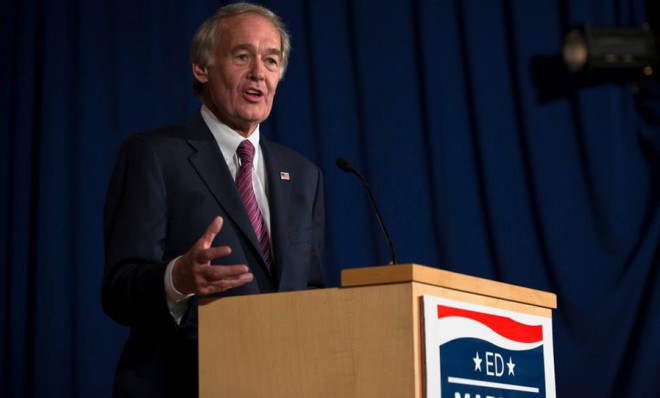What Ed Markey's Senate win in Massachusetts means for 2014
Democrats, for one, say Markey's victory proves GOP rebranding didn't work


U.S. Rep. Ed Markey defeated first-time Republican candidate Gabriel Gomez, a businessman and ex-Navy SEAL, to win a Massachusetts special election, keeping Secretary of State John Kerry's old Senate seat in the Democrats' hands. Gomez had hoped to repeat the upset Scott Brown had pulled off for the GOP when he won Ted Kennedy's seat after the liberal icon died in 2009, but Gomez lost in the heavily Democratic state by 10 percentage points.
The outcome was no big shock — Markey is well-known after serving his Boston district for 37 years, while Gomez is a newcomer; Markey spent $8.6 million, compared to Gomez's $2.3 million. For Democrats — rattled by big midterm losses in President Obama's first term — Markey's victory still came as a reassuring sign. As Alexander Burns and James Hohmann put it at Politico: "If there's a wave building for the 2014 elections, somebody forgot to tell Massachusetts."
The state that heralded the GOP wave of 2010 by sending Republican Scott Brown to the Senate decided against a repeat performance Tuesday...
It's a return to politics as usual in Democratic Massachusetts — and perhaps an early indication that after back-to-back midterm election tsunamis, the country might be in for a more conventional 2014. [Politico]
Republicans in Massachusetts say, however, that it's a mistake to expect Tuesday's results to be repeated in 2014. In this special election, turnout was low, and voters were distracted by a string of events, including the Boston Marathon bombings and the Bruins' Stanley Cup run. Those factors worked against Gomez, who needed steady coverage to introduce himself to voters. That was a big obstacle for Gomez who, as Hillary Chabot notes in the Boston Herald, was trying to counter his lack of name recognition by running on a promise to bring "a breath of fresh air to the U.S. Senate."
The Week
Escape your echo chamber. Get the facts behind the news, plus analysis from multiple perspectives.

Sign up for The Week's Free Newsletters
From our morning news briefing to a weekly Good News Newsletter, get the best of The Week delivered directly to your inbox.
From our morning news briefing to a weekly Good News Newsletter, get the best of The Week delivered directly to your inbox.
Despite Gomez's loss, Republican consultant Rob Willington tells the Herald that 2014 will be a different story. There will be a gubernatorial election, so turnout is expected to be heavier, and the issues the candidates will be debating will be different. "I think 2014 is a gubernatorial year where the party goes on offense," Willington says, pointing to the success of Republicans — including Mitt Romney — in past races for the governor's job. "We're more successful in races where we're talking about state issues instead of national ones."
And Gomez and his fellow Massachusetts Republicans won't have to wait long for a do-over. Markey has just 17 months before he faces re-election. The now-battle-tested Gomez might stand a chance in a rematch, and bigger GOP names, including former senator Scott Brown, might be able to mount a formidable challenge, too.
Democrats, on the other hand, are spinning Gomez's defeat as evidence that the GOP's rebranding effort, prompted by an internal report highlighting the party's need to win over women and minorities, is not working. Steve Peoples at The Huffington Post says that, "on paper, the Spanish-speaking Gomez, a former Navy SEAL with moderate views on social issues, was the kind of candidate the RNC had sought."
Still, Peoples notes, Democrats shouldn't get too comfy. "The Massachusetts contest," he says, "served as a reminder that Obama faces considerable political challenges in more competitive Senate contests in less-friendly terrain in 2014, when Democrats' grip on the Senate majority will be tested."
A free daily email with the biggest news stories of the day – and the best features from TheWeek.com
Harold Maass is a contributing editor at The Week. He has been writing for The Week since the 2001 debut of the U.S. print edition and served as editor of TheWeek.com when it launched in 2008. Harold started his career as a newspaper reporter in South Florida and Haiti. He has previously worked for a variety of news outlets, including The Miami Herald, ABC News and Fox News, and for several years wrote a daily roundup of financial news for The Week and Yahoo Finance.
-
 Political cartoons for January 25
Political cartoons for January 25Cartoons Sunday's political cartoons include a hot economy, A.I. wisdom, and more
-
 Le Pen back in the dock: the trial that’s shaking France
Le Pen back in the dock: the trial that’s shaking FranceIn the Spotlight Appealing her four-year conviction for embezzlement, the Rassemblement National leader faces an uncertain political future, whatever the result
-
 The doctors’ strikes
The doctors’ strikesThe Explainer Resident doctors working for NHS England are currently voting on whether to go out on strike again this year
-
 The billionaires’ wealth tax: a catastrophe for California?
The billionaires’ wealth tax: a catastrophe for California?Talking Point Peter Thiel and Larry Page preparing to change state residency
-
 Bari Weiss’ ‘60 Minutes’ scandal is about more than one report
Bari Weiss’ ‘60 Minutes’ scandal is about more than one reportIN THE SPOTLIGHT By blocking an approved segment on a controversial prison holding US deportees in El Salvador, the editor-in-chief of CBS News has become the main story
-
 Has Zohran Mamdani shown the Democrats how to win again?
Has Zohran Mamdani shown the Democrats how to win again?Today’s Big Question New York City mayoral election touted as victory for left-wing populists but moderate centrist wins elsewhere present more complex path for Democratic Party
-
 Millions turn out for anti-Trump ‘No Kings’ rallies
Millions turn out for anti-Trump ‘No Kings’ ralliesSpeed Read An estimated 7 million people participated, 2 million more than at the first ‘No Kings’ protest in June
-
 Ghislaine Maxwell: angling for a Trump pardon
Ghislaine Maxwell: angling for a Trump pardonTalking Point Convicted sex trafficker's testimony could shed new light on president's links to Jeffrey Epstein
-
 The last words and final moments of 40 presidents
The last words and final moments of 40 presidentsThe Explainer Some are eloquent quotes worthy of the holders of the highest office in the nation, and others... aren't
-
 The JFK files: the truth at last?
The JFK files: the truth at last?In The Spotlight More than 64,000 previously classified documents relating the 1963 assassination of John F. Kennedy have been released by the Trump administration
-
 'Seriously, not literally': how should the world take Donald Trump?
'Seriously, not literally': how should the world take Donald Trump?Today's big question White House rhetoric and reality look likely to become increasingly blurred
